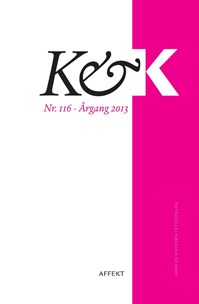URETFÆRDIGHEDSSTEMNING - POETISK URETFÆRDIGHED I GUSTAVE FLAUBERTS ”ET ENFOLDIGT HJERTE”
DOI:
https://doi.org/10.7146/kok.v41i116.15893Nøgleord:
Gustave Flaubert, Charles Taylor, Sianne Ngai, poetic justice, justice, political philosophy, affect theoryResumé
THE SENSE OF WRONG. POETIC INJUSTICE IN GUSTAVE FLAUBERT’S ”A SIMPLE SOUL” | Gustave Flaubert’s late short story ”A simple soul” from 1877 defies any expectation of poetic justice. Absolutely no justice is done to Mdm Aubain’s hard-working maid Félicité. Using Félicité’s sad case, this article will set out to rethink the theoretical approach to the relationship between fiction and justice. The basic claim being that justice in fiction does not necessarily take shape as an administration of justice but can also be present as a mood of injustice. ”A simple soul” does not depict somebody who experiences a sense of injustice and cries out loud to somebody else; instead, an anonymous something is crying to heaven. The article conceptualizes this atmospheric mood of injustice by comparing Madame Aubin’s maid to six other subordinate and oppressed female figures from Western cultural history.Downloads
Citation/Eksport
Holm, I. W. (2013). URETFÆRDIGHEDSSTEMNING - POETISK URETFÆRDIGHED I GUSTAVE FLAUBERTS ”ET ENFOLDIGT HJERTE”. K&K - Kultur Og Klasse, 41(116), 103–119. https://doi.org/10.7146/kok.v41i116.15893
Nummer
Sektion
Artikler
Licens
Tidsskriftet følger dansk ophavsret.





